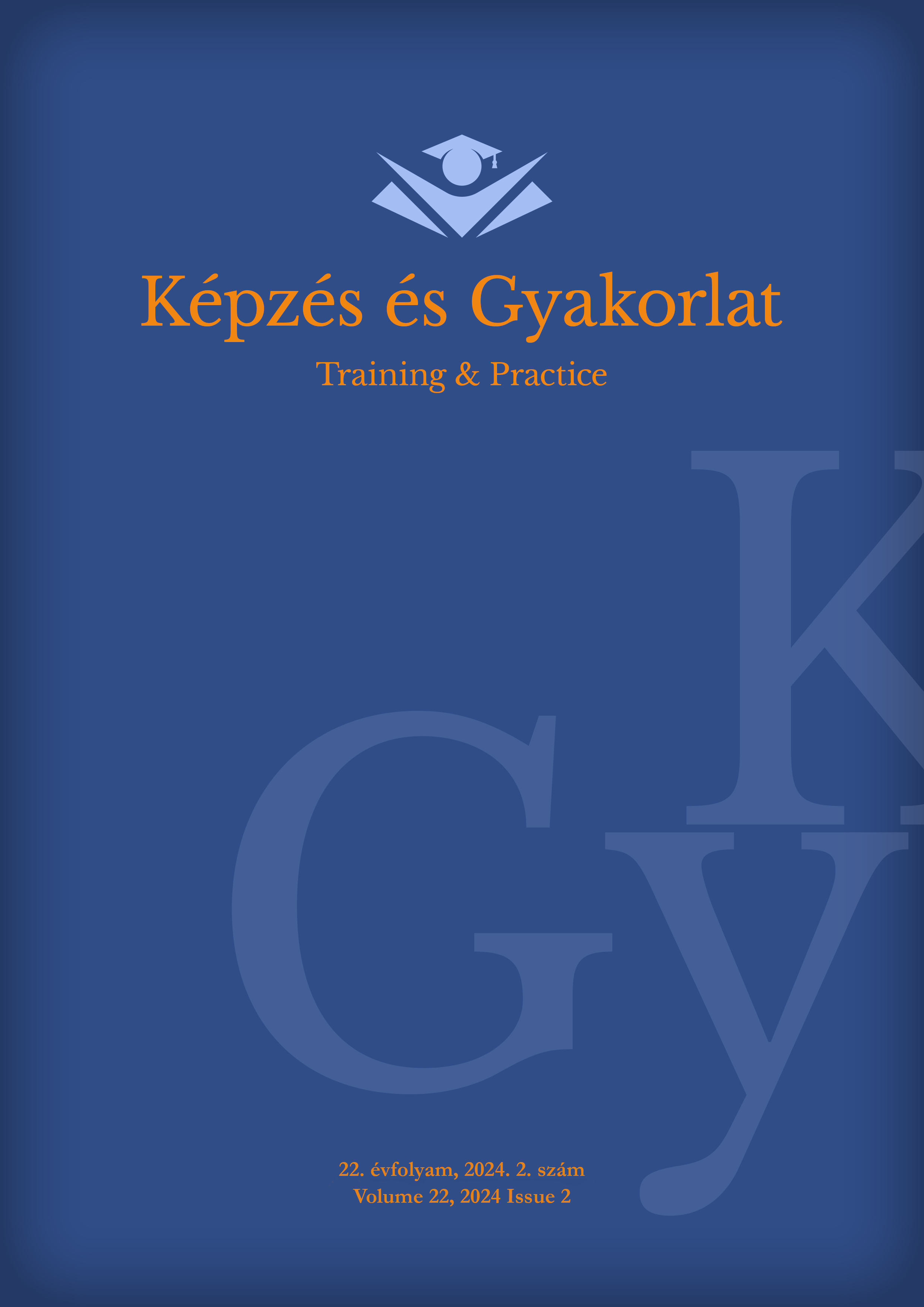The contradictions of recurrent education – experiences of adult education courses
DOI:
https://doi.org/10.17165/tp.2024.2.15-26Keywords:
recurrent education, labour market training, expectations of participantsAbstract
The paradigm of lifelong learning is based on the assumption that in a competitive knowledge-based society and economy, there is an increasing demand for institutions supporting adult learning to adapt to individual and community expectations, so that individuals can start learning at any stage of their lives and choose any form of learning. In this context, in the 1970s and 1990s, adult learning was significantly defined by the theoretical concepts and models that appeared in connection with recurrent education and were applied within the concept of lifelong learning, as part of the concept of recurrent education. In our study, we analyse the effectiveness of subsidized labour market training and the motivations, opinions and expectations of the participants. Questionnaire data collection and focus group interviews were conducted with the training participants in Nyíregyháza between 2012-19, in the framework of five courses. Among the results of the research, we present the effects of the main phenomena and variables shaping “returning education". We interpret our research as an exploratory, problem-formulating one, taking into account our statement regarding returning education, according to which returning education and participation in training are in many cases shaped by external constraints (despite the exploratory nature of the research, we formulated our hypotheses in order to test the basic thesis).
References
Ábrahám, K. (2015a). A felnőttképzés integrációs szerepe az alacsony képzettségűek körében az Észak-alföldi régióban. Socio.hu 5(3), 223–238. https://socio.hu/index.php/so/article/view/534
Ábrahám, K. (2015b). Felnőttként az iskolapadban. A felnőttképzés szerepe az érettségivel nem rendelkező személyek munkaerő-piaci integrációjában. L’ Harmattan Kiadó.
Barry, J. H. (2015). Much in Little? Revisiting ‘lifelong education’, ‘recurrent education’, and ‘de-schooling’ in the age of ‘lifelong learning’. In World Forum 2015 Lifelong learning for all. UNESCO – Paris, 5-6 February 2015. Volume: Contributions 4th World Forum, number 5a (pp. 1–28.). https://unesdoc.unesco.org/ark:/48223/pf0000243724
Csoma, Gy. (2009). Felnőttoktatási sajátosságok. https://ofi.oh.gov.hu/tudastar/problemak-kerdesek/felnottoktatasi
Faure, E., Herrera, F., Kaddoura, A. R., Lopes, H., Petrovski, A.V., Rahnema, M., & Ward, F. C. (1972). Learning to be: the world of education today and tomorrow. UNESCO. https://unesdoc.unesco.org/ark:/48223/pf0000001801
Györgyi, Z. (2012). A képzés és a munkaerőpiac - Találkozások és töréspontok. Új Mandátum Könyvkiadó.
Hajdú, D., & Koncz, G. (2021). Megélhetési tanulók a Borsod-Abaúj-Zemplén megyei felnőttképzésben. Területi Statisztika, 61(2), 229–254. https://doi.org/10.15196/TS610206
Hajdú, D. (2023). Az álláskeresőknek meghirdetett felnőttképzés vizsgálata Borsod-Abaúj-Zemplén vármegyében. [PhD értekezés tézisei]. MATE Gazdaság-és Regionális Tudományok Doktori Iskola. https://phd.mater.uni-mate.hu/282/6/tezis_DOI.pdf
Halmos, Cs. (2005). A felnőttképzésben résztvevők elhelyezkedése, különös tekintettel a hátrányos helyzetű rétegekre, régiókra. Kutatási zárótanulmány. Nemzeti Felnőttképzési Intézet.Harangi, L. (2009). A „lifelong learning” paradigma és hatása a közoktatásra. Magyar Pedagógiai Társaság Felnőttnevelési Szakosztály. https://ofi.oh.gov.hu/tudastar/tanulas-kora/lifelong-learning
Hasan, A. (1996). Lifelong learning. In A. C. Tuijnman (Ed.), The international encyclopedia of adult education and training (2nd ed., pp. 33–41). Pergamon Press.
Homolya-Juhász, F. (2016). 2016. évben befejezett főbb aktív foglalkoztatáspolitikai eszközök hatékonyságának vizsgálata. Nemzetgazdasági Minisztérium Elemzési és Bérpolitikai Osztálya.
Jarvis, P., & Wilson, A.L. (2022). International Dictionary of Adult and Continuing Education. Kogan Page.
Kovács, I. V. (2004). A lisszaboni folyamat és az oktatás. Barcelonától az első időközi jelentés elfogadásáig (2002-2004 március). Új Pedagógiai Szemle 54(7-8), 153–174.
Le Dai, B. (2022). Az álláskeresők körében végzett felnőttképzés munkaerőpiaci hatásai Szabolcs-Szatmár-Bereg megyében. Studia Mundi – Econimica, 9(4), 64–73. https://doi.org/10.18531/Studia.Mundi.2022.09.04.64-73
National Agency for Education (2000). Lifelong Learning and Lifewide Learning. Liber Distribution Publikationstjänst.
Németh, B. (2003). A lifelong learning paradigmája és annak hatása az Európai Unió oktatáspolitikájára. PTE BTK Interdiszciplináris Doktori Iskola, Politikatudományi Doktori Program. https://idi.btk.pte.hu/dokumentumok/disszertaciok/nemethbalazstezis.pdf
Nyilas, O. (2021a). Kényszer vagy kitörési lehetőség a visszatérő tanulás a felnőttképzésben? In I. Novák (Ed.), Felemelő oktatás: Tanulmányok Fónai Mihály tiszteletére (pp. 138–148). CHERD-Hungary.
Nyilas, O. (2021b). Lifelong learning vagy „visszatérő tanulás”? In Gy. Molnár, & E. Tóth (Eds.), A neveléstudomány válaszai a jövő kihívásaira. XXI. Országos Neveléstudományi Konferencia. Program, előadás-összefoglalók (p. 343). MTA Pedagógiai Tudományos Bizottság, Szegedi Tudományegyetem Neveléstudományi Intézet.
Nyilas, O. (2022). Lifelong learning és a valóság. In A. Bordás, & M. K. Domján (Eds.), Egy évtized kihívásai, változásai a pedagógusképzés és a neveléstudományok területén. III. Oktatás Határhelyzetben Konferencia – absztraktkötet (p. 41). Partiumi Keresztény Egyetem.
Sutton, P. J. (1996). Lifelong and Continuing Education. In A. C. Tuijnman (Ed.), International Encyclopedia of Adult Education and Training (2nd ed., pp. 27–33). Pergamon Press.
Tuijnman, A.C. (1996). Recurrent Education. In A. C. Tuijnman (Ed.), International Encyclopedia of Adult Education and Training (2nd ed., pp. 99–106). Pergamon Press.
Downloads
Published
Issue
Section
License
Copyright (c) 2024 Fónai Mihály, Nyilas Orsolya

This work is licensed under a Creative Commons Attribution-NonCommercial-NoDerivatives 4.0 International License.












